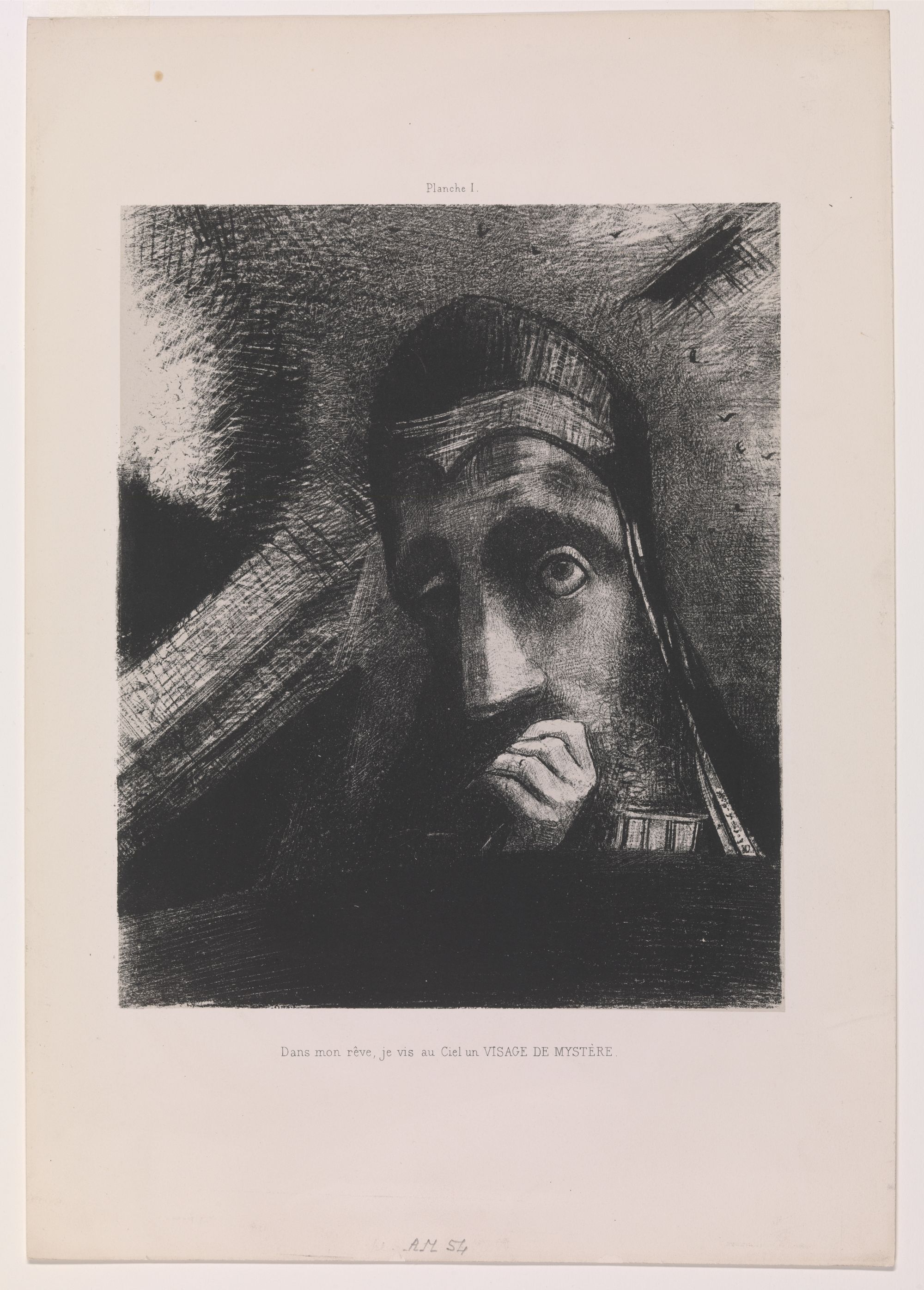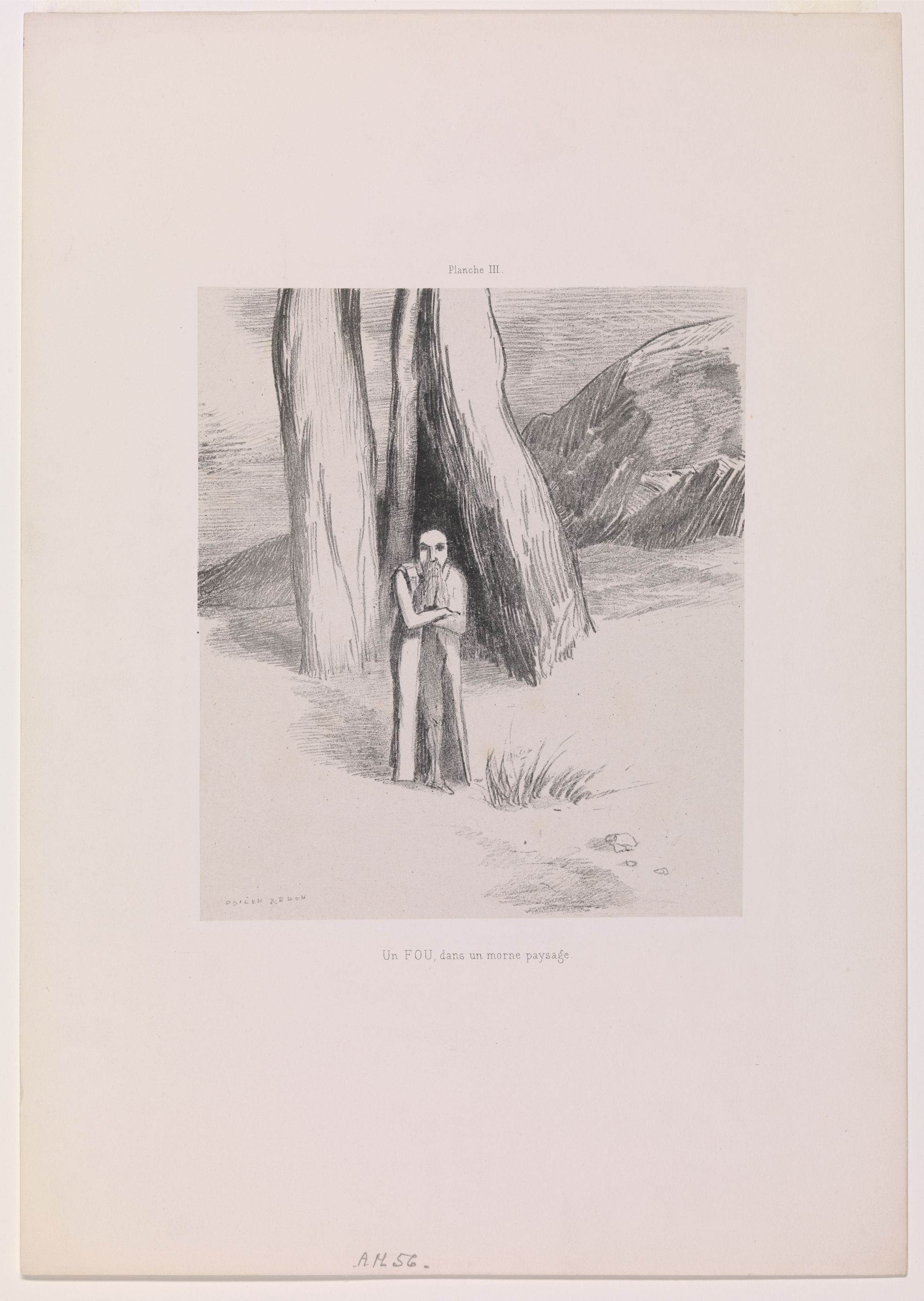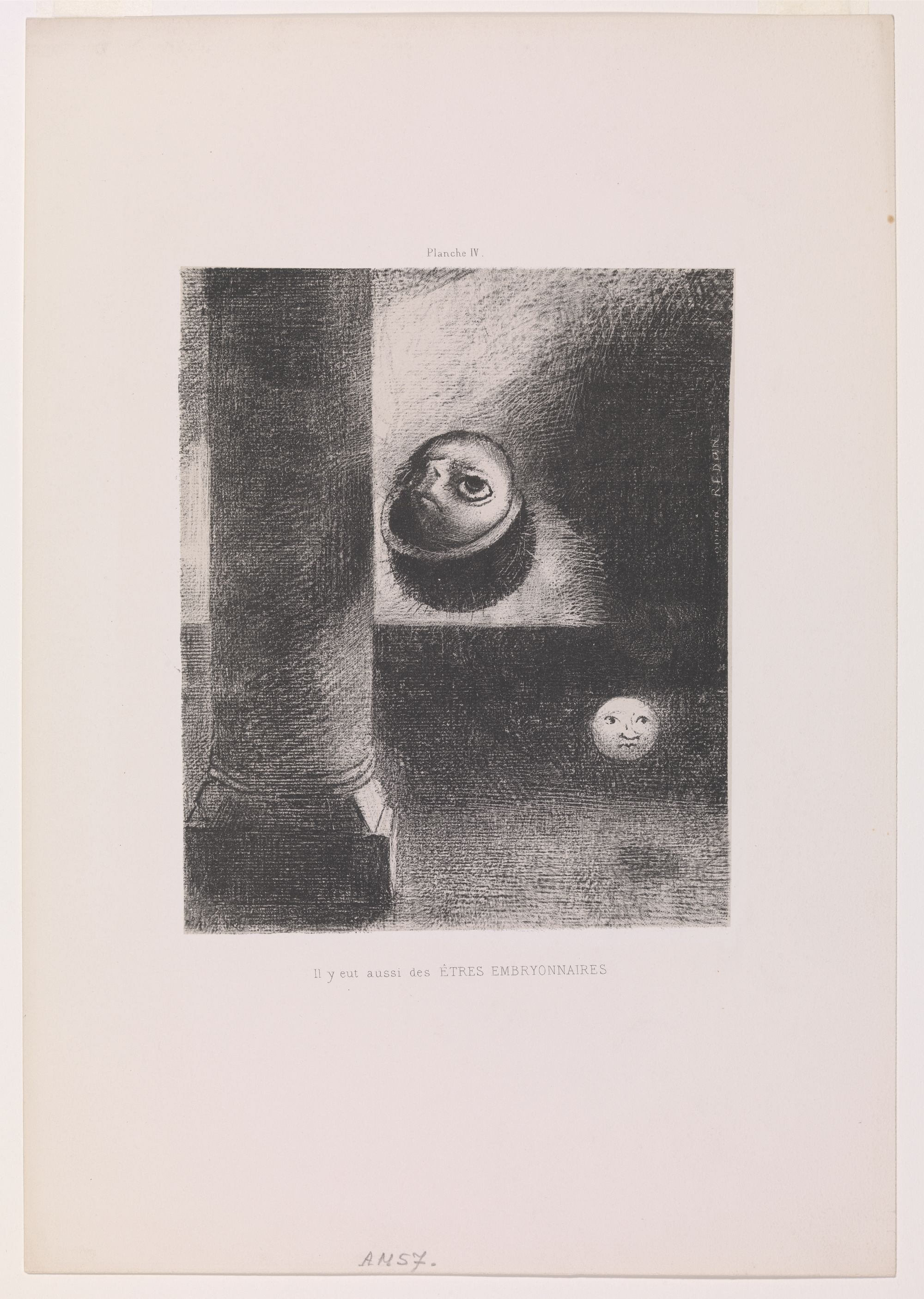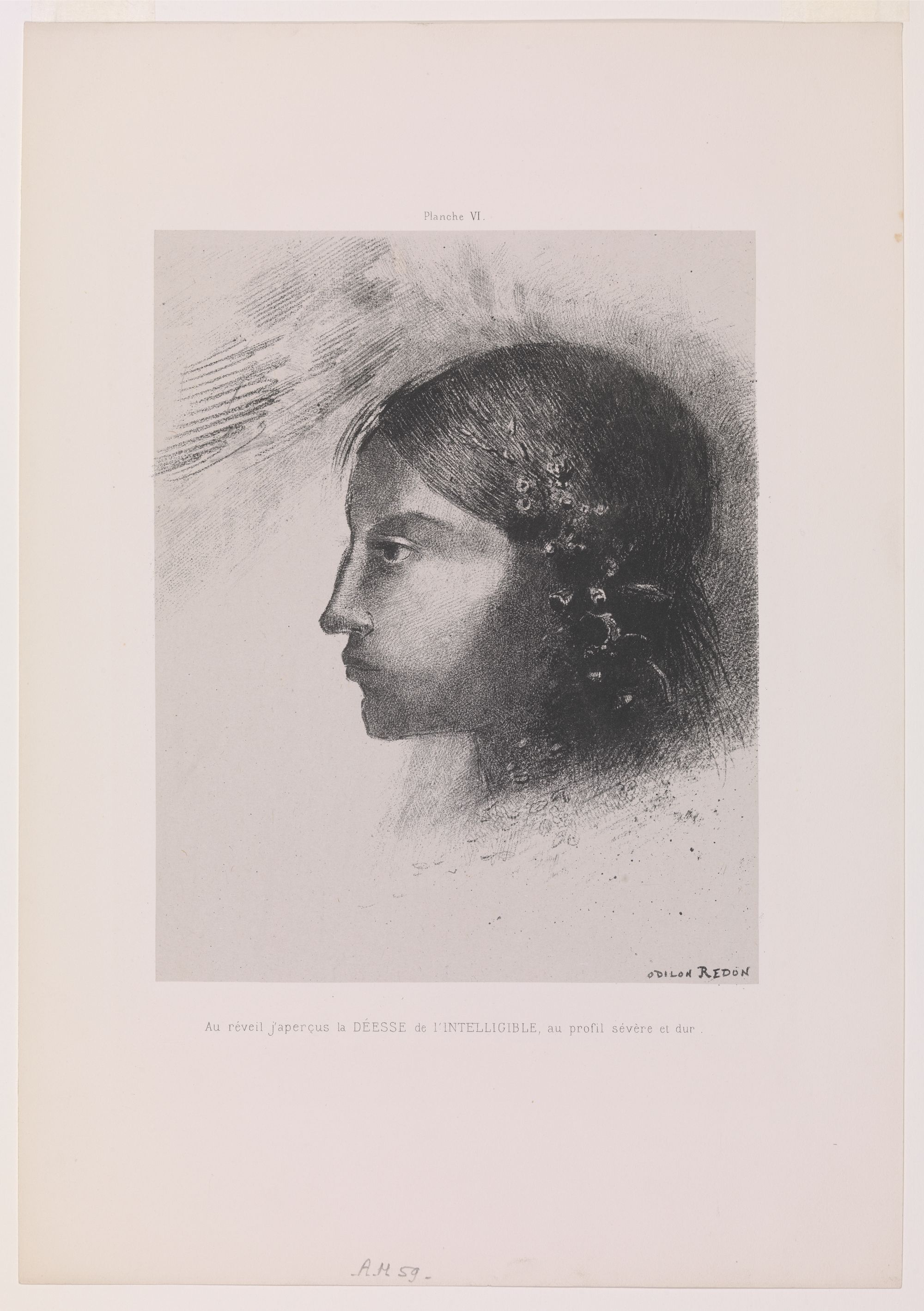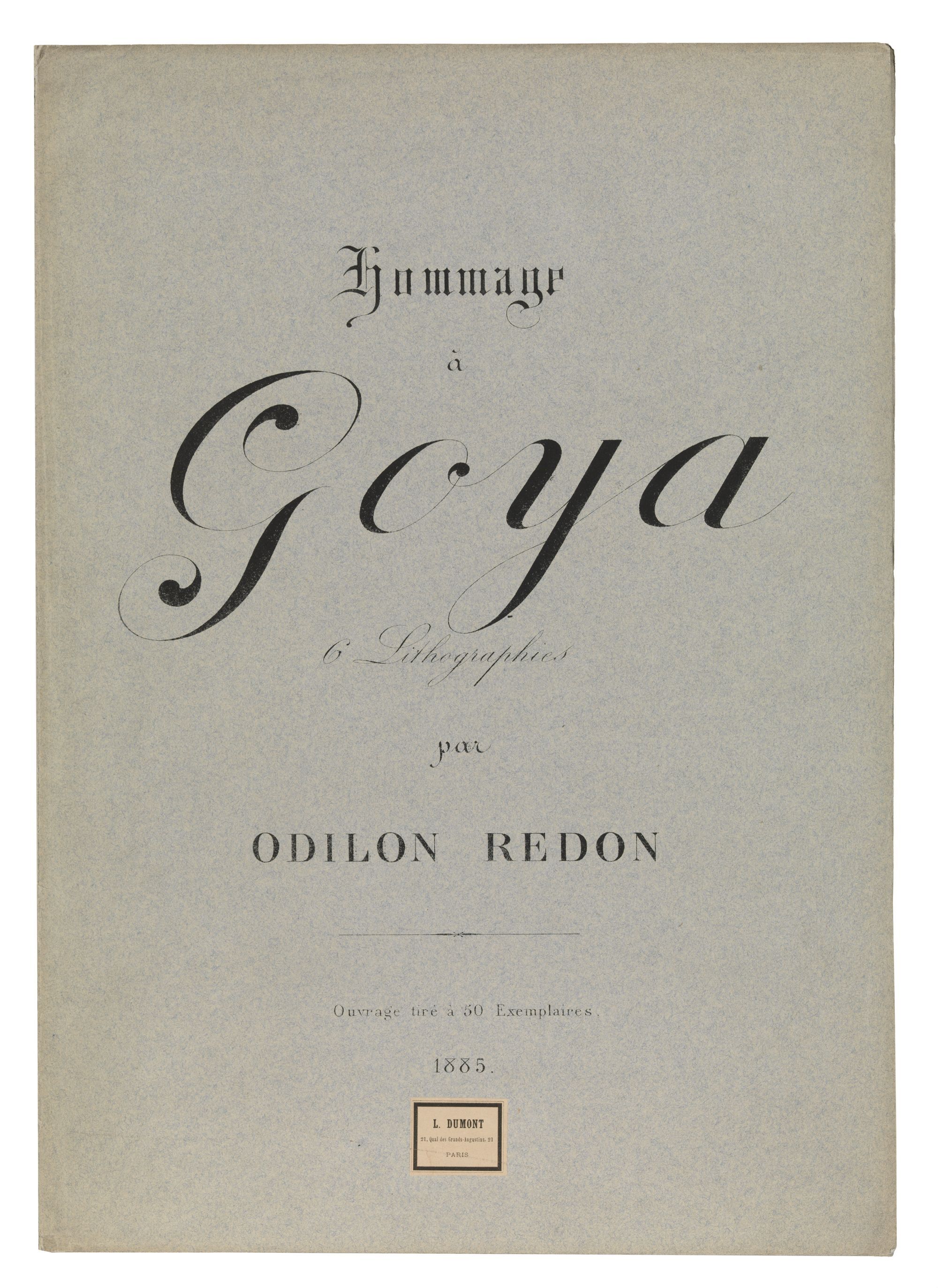Hommage à Goya is one of the most important graphic series by French artist Odilon Redon. Typical of his work is the alienating combination of bizarre figures and their indeterminate, often desolate surroundings. Redon's graphic mastery is evident in his abstract linework, treatment of chiaroscuro and deep blacks. The folder includes a cover with justification of printing and six lithographs on chine appliqué. Each print bears an enigmatic title. Together, the titles form a poem: 1. Dans mon rêve, je vis au ciel un visage de mystère [In my dream, I saw in the sky a mysterious face] / 2. La fleur du marécage, une tête humaine et triste [The marsh flower, a sad human head] / 3. Un fou dans un morne paysage [A madman in a dead landscape] / 4. Il y eut aussi des êtres embryonnaires [There were also embryonic beings] / 5. Un étrange jongleur [A strange balancing artist] / 6. Au réveil j'aperçus la Déesse de l'Intelligible au profil sévère et dur [Upon awakening, I saw the goddess of the intelligible in a severe and hard profile]. In 1886, Redon showed the folder at the exhibition of the Brussels art circle Les Vingt. The artist's fantastic imagery, his mastery of black and his graphic métier were an inspiration to members of the art circle, especially James Ensor. Ensor, who shared with Redon a fascination for Goya, was mainly active as a draughtsman during this period and worked on the series The Aureoles of Christ, of which the Museum of Fine Arts Ghent preserves two large-format drawings. It is possible that the serial nature of Redon's work inspired Ensor. Similar is certainly their mutual fascination with the expressive possibilities of light and preference for light-dark effects. There are also iconographic parallels: their fascination with fantasy, with literature (Edgar Allan Poe) and with the stories in the Bible. The album was published in February 1885, printed by Lemercier et Cie in Paris and distributed by L. Dumont, also based in Paris. The series was successful and was reprinted on an edition of 25 copies, which André Mellerio said was of inferior quality. The album in the Ghent collection is one of 50 copies of the first edition. In the second edition, the second plate shows a black spot on the edge of the figure's calotte; this spot is missing in the Ghent album.
| Artist |
Odilon Redon
RKD
VIAF
Wikidata
|
|---|---|
|
Lemercier et Cie
|
|
| Title | The Marsh Flower, a Sad Human Head |
| Date | 1885 |
| Period | 19th century |
| Location |
France
TGN
Paris TGN |
| Medium and support | lithography AAT |
| Signatures, inscriptions, and markings | signatures (names) bottom left: ODILON REDON |
| title outside the depiction, centre below: La FLEUR du MARECAGE, une tête humaine et triste | |
| state (creative stage) centre below: 1er tirage | |
| Collection | print room |
| Object type | lithographs AAT |
| Inventory number | 2011-C-3 |
| Acquisition credit |
purchase
Marc Rosen Fine Art New York City 2011 |
| Current whereabouts | Work currently not on display |
| Permalink | https://mskgent.be/collection/work/data/2011-C-3 |
| IIIF Manifest | https://imagehub.mskgent.be/iiif/3/5986/manifest.json |
| Art & Architecture Thesaurus |
300189808
figures (representations)
AAT
300055865 symbolism (artistic concept) AAT |
|---|---|
| Keywords Iconclass |
21D
water (one of the four elements)
Iconclass
25G plants; vegetation Iconclass 25H23 sea (seascape) Iconclass 25H2322 sea Iconclass 31A221 head (human) Iconclass 31A71 male sex; man Iconclass 52A4 Imagination; 'Imaginatione' (Ripa) Iconclass 52A44 Fantasy, Caprice; 'Capriccio' (Ripa) Iconclass 56BB1 Pain, Sorrow, Sadness; 'Dolore', 'Dolore di Zeusi' (Ripa) Iconclass |
| School / Style |
Symbolism (artistic concept)
AAT
phantasy |
| Odilon Redon : Les Estampes = The Graphic Work ; Catalogue Raisonné / Alan Hyman, André Mellerio. - San Francisco : Alan Wofsy Fine Arts, 2001 (nr. 55) |
|
Do you have any suggestions, questions or information about this work? Write us, collectie.msk@stad.gent |
